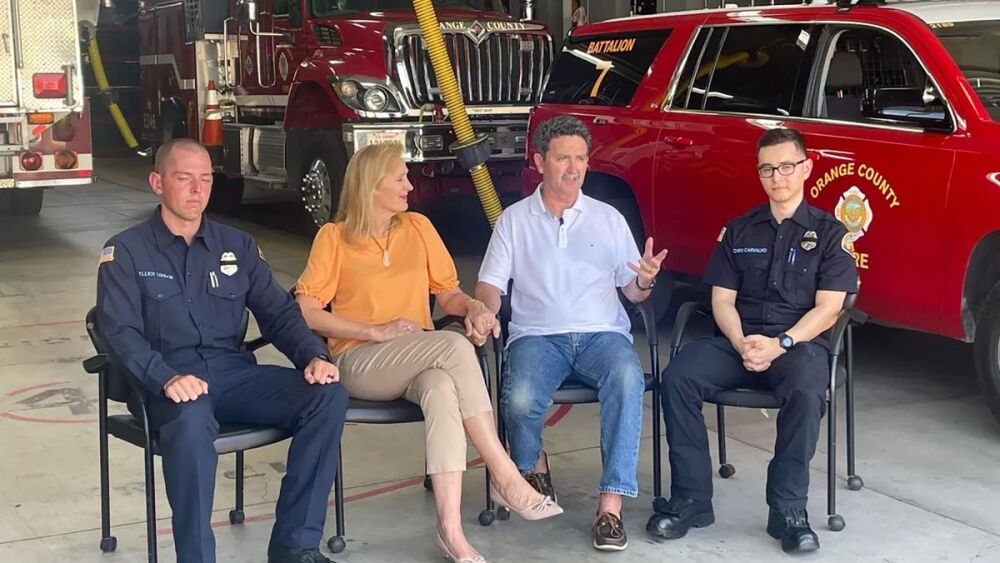By Nathan Solis
Los Angeles Times
LOS ANGELES — When Steve Kielty woke up from a medically induced coma his wife, Sharon, leaned over and explained his heart had stopped beating.
“No way,” he said incredulously from his hospital bed.
Before he collapsed in their Rancho Santa Margarita home on the morning of July 1, Steve Kielty, 62, worked in his garden and complained of indigestion. Sharon Kielty, 59, was in the bathroom, a few feet away when she heard her husband let out a bone-chilling gasp and hit his head on a doorway.
She frantically called 911 and was met by the calm voice of Chris Carvalho, a 28-year-old trainee dispatcher with the Orange County Fire Authority who started his job two months earlier.
“My husband just had a heart attack and collapsed on the floor. He’s turning red and purple, please come,” she said in a high-pitched voice.
“Does it look like he’s still breathing?” Carvalho asked.
When she wasn’t sure, Carvalho instructed Sharon Kielty on how to start chest compressions.
“So go ahead and take one hand, put it over the center of his chest, right between his nipples. Take your other hand and put that on top of the other hand. Then I need you to press hard and fast at a rate of about 100 per minute,” Carvalho said.
Throughout the roughly five-minute phone call, Sharon Kielty pleaded with her husband to wake up. He let out a strained gasp.
Carvalho said that a gasp was not the same as breathing and told her to keep up the compressions.
“You’re doing great,” he said in a placid voice. “You’re acting as his pulse now. Remember that, so just keep going.”
Paramedics arrived a few minutes afterward and Carvalho waited until they took over before he ended the call.
The paramedics used a defibrillator to restart Steve Kielty’s heart after they monitored his vital signs, Capt. Josh Feldman with the Orange County Fire Authority said.
“Clinically, he was dead,” Feldman said.
As paramedics wheeled Steve Kielty out, Feldman, 40, saw Sharon Kielty was distraught. He reassured her the paramedics were able to restart her husband’s heart and she did all that she could do before they got there.
“I think I told her, ‘He’s in a good place,’ ” Feldman said. “I gave her that peace of mind, because I would hope that someone would do the same for me.”
She replayed his words of encouragement in the middle of the night when she sat by her husband’s bed in the ICU at Mission Hospital in Mission Viejo.
She continuously prayed with friends, family and priests as neurologists and other specialists monitored her husband’s condition. It was not immediately clear if he would have brain damage.
During that time, she couldn’t help but reflect on their life together, when they first met at UC San Diego and when they both trained as lifeguards in college. He majored in engineering and she in computer science.
They graduated, married and raised three sons. After nearly 35 years of marriage, Sharon Kielty had to rely on her CPR training to give her husband a fighting chance. She believes God had a plan for her the day her husband’s heart stopped.
The Kieltys were invited to a vacation home on the Colorado River just a few days before his cardiac arrest.
She couldn’t help but wonder if he would have survived if they were 45 minutes away from the nearest hospital. She wonders what would have happened if her husband collapsed in the garden, not in their carpeted walk-in closet.
She wonders what would have happened if she was out on a morning walk. But a voice told her that morning to stay home.
“That was divine intervention,” she said. “I know it was God whispering, ‘You’re needed here.’ ”
When Steve Kielty was brought out of the coma, doctors explained that even though he lived a healthy lifestyle and had no other medical conditions, his heart had stopped and he had a long road to recovery, but there didn’t seem to be any major damage to his body.
Feldman and other medical professionals call his recovery a miracle.
“In the medical field, there’s a saying that time is tissue,” Feldman said, meaning that every second can spell damage for a vital organ.
He credits Sharon Kielty’s quick-thinking to perform CPR but she credits him, firefighter Elliot Loudon, paramedics Dylan Marquez and Gentry Phillips and Carvalho.
“They are my boys now,” Sharon Kielty said when the group met at her home earlier this month with ABC 7 News.
Carvalho worked as an EMT for five years before he became a dispatcher. His mother worked as a nurse while he grew up in Orange County. He understands the importance of bedside manner while someone is experiencing probably one of the worst days in their life.
“You definitely have good days, you definitely have not so favorable days, but overall, it’s a great position,” Carvalho said about his job as a dispatcher.
Typically, the Orange County Fire Authority receives about 550-600 calls a day, Carvalho said. He’s grateful the Kieltys are a success story, but remarks that’s just one call, and usually dispatchers don’t have time to reflect or follow up, because there’s always another call waiting.
©2023 Los Angeles Times.
Visit at latimes.com.
Distributed by Tribune Content Agency, LLC.












